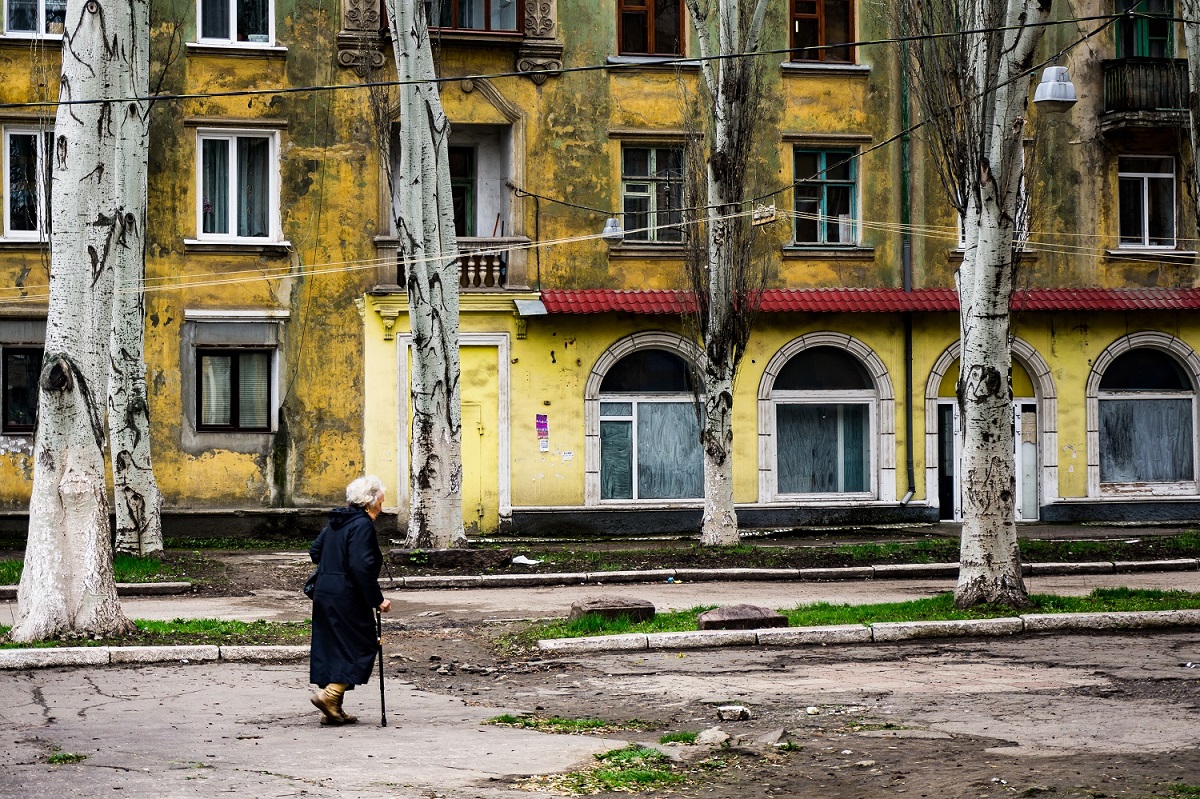
The ongoing conflict in eastern Ukraine between the Government and armed groups is disproportionately harming older people, especially older women and older people with disabilities, according to a new UN report. An estimated 30% of people (more than one million) affected by the conflict since 2014 are older people, many of whom have been driven from their homes by the violence along the contact line that divides Government and non-government-controlled areas in the Donetsk and Luhansk regions.
An estimated 3.5 million people need humanitarian assistance and protection. This number is continuing to rise due to the ongoing impact of the conflict on people’s mental health, restricted freedom of movement, widespread landmines, and a lack of access to food and basic services such as healthcare, housing, and pensions and other social benefits. Worsening security and the suspension of social benefits for hundreds of thousands of internally displaced people has meant the situation for older people continues to deteriorate.
HelpAge International has been working in Ukraine since 2015, with a humanitarian response in more than 20 districts along the contact line. Activities include the provision of community safe spaces for older people, targeted advocacy and coordination with NGOs, UN agencies and relevant authorities to ensure the inclusion of older people in the delivery of services, and psychosocial support. Peer-to-peer support groups have been established and home-based care activities, assistive devices, and hygiene kits have also been provided.
This year we conducted a baseline survey of 4,595 older women and men aged 60 and over and living within 5km of the contact line. Together with work commissioned for our global report Missing millions: how older people with disabilities are excluded from humanitarian response, the results show that older people, especially those with disabilities, continue to face severe challenges. These include:
- Difficulties escaping or avoiding fighting, which can lead to being separated from family, and to social exclusion and isolation. The vast majority (96%) of older people surveyed are experiencing conflict-related mental health issues.
- Severe income shortages, due to low pension levels and difficulty accessing payment points due to discriminatory attitudes and physical barriers. Nearly every older person affected (99%) relies on a pension as their main source of income, which means these barriers have a significant impact.
- A lack of access to and difficulty affording healthcare. With 97% of people surveyed having a least one chronic disease, not being able to access healthcare is a major issue.
- Poor living conditions and a lack of support for those with disabilities. Over half (53%) of older people reported needing assistive devices, including walking frames, canes and toilet chairs.
“We sometimes go without food. We spend most of our money on medical items. We haven’t enough money. That’s why we sometimes have nothing to eat,” said one older woman we spoke to.
Another said, when recalling being caught up in conflict: “I used to lie down. That’s all I could do. There were no medicines, no doctors, no pension, no food. I remember that time with horror. How did we survive? I don’t know.”
Conditions are deteriorating further with the onset of winter, and further restrictions on access to social entitlements and freedom of movement for people living in eastern Ukraine.
“Winter causes specific challenges for older people as the cost and need for fuel rises and poor weather can mean even further reduced access to services,” said HelpAge project officer in Donetsk, Natalia Bezlepkina. Many aid agencies have left the region, but urgent action is still needed to ensure that all who are affected have their rights to humanitarian assistance and protection upheld. With numerous older women living alone and many experiencing violence and abuse, older women are in greater need of protection and assistance.
For those agencies still present in Ukraine, it is crucial that older people are included in assessments and can participate and benefit from humanitarian support and targeted services. Agencies need to cooperate to ensure appropriate aid reaches older people and those who depend on them, and the unique challenges faced by older people with disabilities are addressed. This could include increasing home visits and outreach services, as well as provision of mental health and psychosocial counselling and support services.
Increased and greater flexibility of funding are needed from humanitarian donors to meet urgent needs. The Government of Ukraine must ensure that all barriers to accessing pensions and other social entitlements, as well as public services, are speedily removed for older people caught up in the conflict.
For those who are required to cross the contact line to access pensions, healthcare or to visit family, crossing procedures need to be significantly improved to avoid older people having to queue for hours, often in bad weather without suitable facilities such as drinking water or toilets.
The full enjoyment of human rights by older people in Ukraine without discrimination is essential, regardless of the ongoing conflict. Humanitarian agencies and Government authorities must ensure that while this conflict continues, older people can access their human rights to protection and assistance in safety and with dignity.
For more information, contact Madeleine McGivern, Humanitarian Advocacy Adviser, or Aisuluu Kamchybekova, Country Director in Ukraine.
